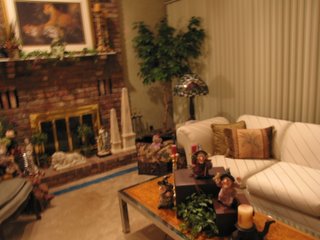Staging Your Home

If you've been reading this blog or any other having to do with real estate you know by now that many markets across America are experiencing a cooling off period. With more inventory coming to the market it is more important than ever to set your place apart from the rest. From the moment you make the decision to sell your home, you need to stop thinking of it emotionally and start looking at it as your "product."
Have you ever walked into a new home development? One glance at the model homes and we're often sold. The marketers of these properties determine the demographic they're playing to and then designers come in to translate that vision into a dynamic theater of the art of the sale. In the same way, your home when staged properly will create a "feeling," of space, design, care and warmth. It will speak to your buying audience in a way that nothing else can and will definitely impact on your bottom line.
Sellers often say, when the subject of staging is broached, that they have no intention of putting any more money into a house they intend to leave. This thinking, though understandable, is short sighted. A small investment in time and money can add thousands to the homeowners pocket and make the process of selling faster and less stressful.
If you've lived in your home for any extended period of time you may need the trained eye of a professional or a good enough friend who can risk telling you a truth you may not want to hear about what your home says about you. Remember, you have only one chance to make a good first impression. Buyers often know within moments of entering your home whether they want to buy it. Clearly, the more potential purchasers for your home, the higher the price you'll likely receive.
Some basics to consider are:
- Removing all clutter from every room in the house. If you don't use it on a regular basis put it away or store it until your move.
- If you have too much furniture in a room, it looks smaller. Furnishings can be stored if they don't add to the ambiance.
- Make sure there is a natural flow to a room. You don't want anything blocking the path or the view.
- Keep it clean! Probably the most important thing you can do to help your agent get your home sold for the best price in the shortest time is to keep it in pristine condition. Homes that are dirty or sloppy suggest to buyers that they haven't been well maintained and it makes them question the major systems of the home as well.
- Many people who have animals don't recognize the odors that permeate the space. At the very least, some well placed, nicely scented candles can help.
Staging is a rapidly growing aspect of marketing homes. It's popularity is crossing the nation and is routinely done in many markets. On Long Island it's a relatively new phenomenon, although I've been doing it for years. I still remember a home I had on the market years ago at a time when houses weren't selling fast and the competition was fierce. Having a few issues over which I had no control, I recommended to the homeowners that they replace some aging shag carpeting throughout the first floor and onto the second level. They resisted for months and the search for the right buyer was ongoing and frustrating for us all. Finally they gave me the go ahead and we ordered off white carpet to be installed over a quality padding. The installation took place on a Tuesday. With that very distinctive new carpet smell very much present, we held the house open on Sunday, as we had many times before. A buyer who had seen it several weeks before and said at the time it was $60,000 overpriced came in, toured the home quickly and made an immediate offer. He happily told his wife that the new lower price now made it a value. There had been no price adjustment at all. Total cost for this happy ending -- under $2,000.
If you're a fan of HGTV as I am, you've seen the wonderful staging done for $2,000 and some sweat equity on a program called "Designed To Sell." The dramatic results of these makeovers always net the sellers many thousands over the cost of the project.








0 Comments:
Post a Comment
<< Home